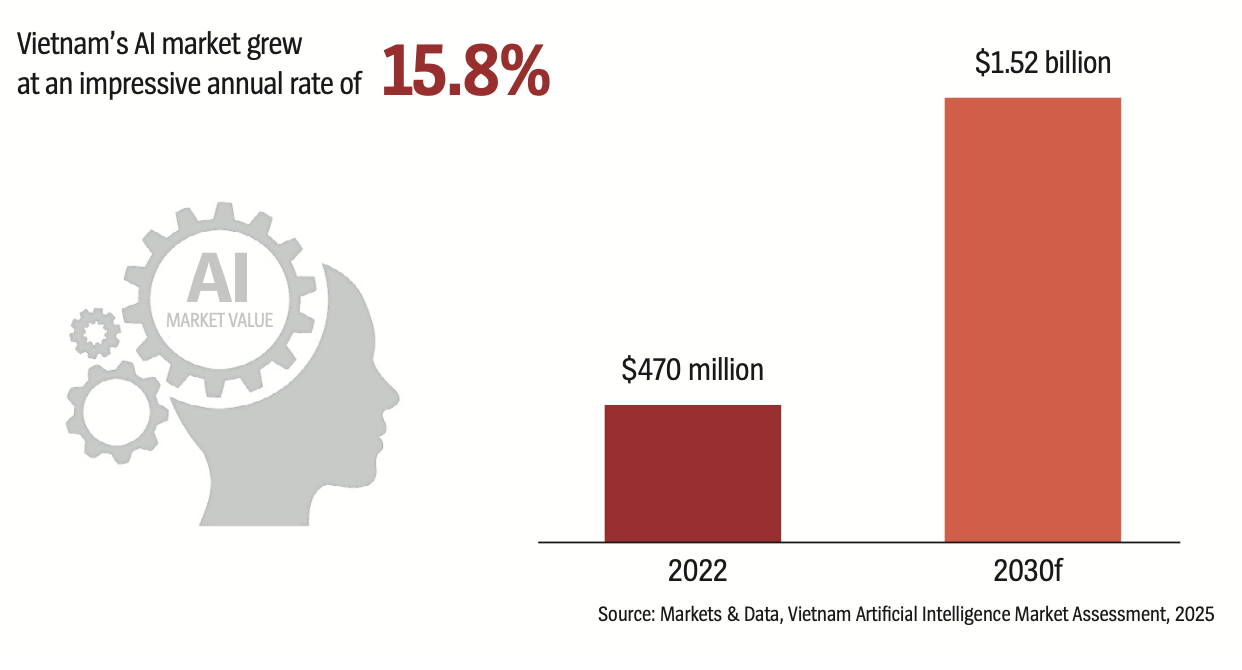
Vietnam’s technology startup ecosystem is entering into a boom phase, emerging as one of the most dynamic innovation hubs in Asia. The country is now home to some 4,000 startups, including four unicorns, the Ministry of Science and Technology reported in 2024.
The digital economy continues to expand at double-digit pace, with internet penetration reaching 80 per cent among nearly 78 million users, and is projected to reach $200 billion in gross merchandise value (GMV) by 2030, driven by key sectors such as e-commerce, fintech, and software development.
According to Mr. Thye Yeow Bok, Head of Startup Ecosystem for Southeast Asia, South Asia and Greater China at Google Asia Pacific, Vietnam is positioning AI as a foundational technology in its national development strategy. Through the National Strategy on AI Research, Development, and Application, the country aims to become one of the leading AI-driven economies in Asia and globally. To realize this vision, localized AI is considered a key factor enabling Vietnamese technology products to meet domestic needs while strengthening their competitiveness against global rivals.
Significant potential & challenges
Mr. Nguyen Hoang Hiep, Chief Operating Officer (COO) of AI Hay, said Vietnam’s AI market is entering into a “maturing” phase. Growth is marked by a new generation of young, dynamic founders with strong technological expertise and a global mindset, supported by investors, startup accelerators, and government initiatives, particularly Politburo Resolutions No. 57 and 68, which recognize AI as a national strategic technology. “Vietnam holds a distinctive position in the region,” he noted. “We are witnessing ambitious young teams identifying niche markets to develop products, especially in localized AI.”
According to Mr. Bok, progress is measured not only in numbers but also in real-world impact. Though total investment in technology startups in Vietnam declined in the first half of 2024, generative AI startups across Southeast Asia, including Vietnam, have shown remarkable resilience. Vietnam is now the second-fastest growing market in the region for generative AI startups, highlighting its potential to become a significant global hub in this field.
Localized AI plays a crucial role in meeting the specific needs of the Vietnamese market, with products and services built on AI models trained with local data better able to capture Vietnam’s cultural, linguistic, and market nuances, creating additional value and differentiation. This localization advantage also allows Vietnamese startups to strengthen their competitive edge against global players. By deploying localized AI applications at scale, Vietnam has a strong opportunity to accelerate its transformation toward a high-tech economy.
From the perspective of a Vietnamese product startup, Mr. Hiep shared practical insights: Vietnamese data, especially truly local information, is not just about language, it carries the country’s culture, mindset, and unique context.
With local data and a team deeply familiar with Vietnamese culture, AI can integrate more closely with the proprietary data of individual businesses, bringing technology closer to end users. International models still dominate general tasks such as writing emails or answering historical questions, but in truly local fields such as education, public administration, law, and taxation, Vietnamese AI has the potential to gain a competitive edge and even lead the market.
With his company Vietnam’s first and largest homegrown AI-powered knowledge research and search platform (recognized in the Forbes Asia 100 to Watch 2025 list), Mr. Hiep highlighted three main obstacles. First, investment capital in Southeast Asia remains limited and is largely concentrated in Singapore. As a company building products for end-users (B2C), AI Hay is still in a growth phase, focusing on attracting users, which makes investors cautious when evaluating a company that has yet to generate revenue. Second, the domestic market presents its own difficulties. AI Hay is among the few “locally-developed AI” products in Vietnam, leaving little room for direct comparisons with other companies in the region. And third, the cost of high-quality infrastructure and talent is a major challenge.
Leadership teams, he continued, must not only convince investors to believe in their long-term vision but also raise awareness about AI and the potential of Vietnamese startups in the regional landscape.
Additionally, Vietnam’s regulatory framework on AI poses its own challenges. Balancing compliance with upcoming AI regulations in the country while remaining competitive with international companies requires a careful strategy. AI Hay designs products under the principles of transparency and explainability, avoids storing sensitive data, and is ready to collaborate with regulators to help build a sustainable AI market in Vietnam.

Towards a Vietnamese AI ecosystem
To help Vietnamese startups accelerate in the AI sector, Google has launched the Google for Startups AI Bootcamp & AI Solutions Lab in the country, containing two main pillars. The first is AI training and skills development, enabling startups to access Google’s latest AI technologies, including advanced products such as the Agent Development Kit. The second is hands-on practice and real-world deployment, supporting startups to build AI MVPs (Minimum Viable Products) that address economic, social, and environmental challenges, with direct guidance from Google engineers and technology partners.
According to Mr. Bok, around 120 Vietnamese startups have joined the program, producing 50 GenAI MVPs. Each qualified startup can receive up to $350,000 in Google Cloud credits, accelerating product development and testing.
Mr. Hiep noted that domestic AI startups still have significant space to commercialize products and expand markets. AI Hay aims to serve 100 million Vietnamese users through ad-based models or premium feature fees while also developing AI solutions for local enterprises, ensuring data security, legal compliance, and full Vietnamese language support.
In the next 2-3 years, sectors expected to prioritize localized AI applications include law, taxation, public administration, and education, where local data and cultural context are decisive. Notably, with Vietnamese customers increasingly favoring domestic products to protect enterprise data, AI Hay stands out with a 100 per cent Vietnamese team and all data stored within Vietnam.
Google has observed that with a dynamic economy, AI-friendly policies, and abundant tech talent, Vietnam has all the “ingredients” to take off. The country’s startups will continue developing AI-first solutions or integrating AI into existing products to deliver greater value to users.
The collaboration between Google and local startups is creating a comprehensive AI ecosystem, helping Vietnam realize its goal of becoming a leading AI hub in Asia while boosting international competitiveness and sustainable development for the local tech startup community.








 Google translate
Google translate